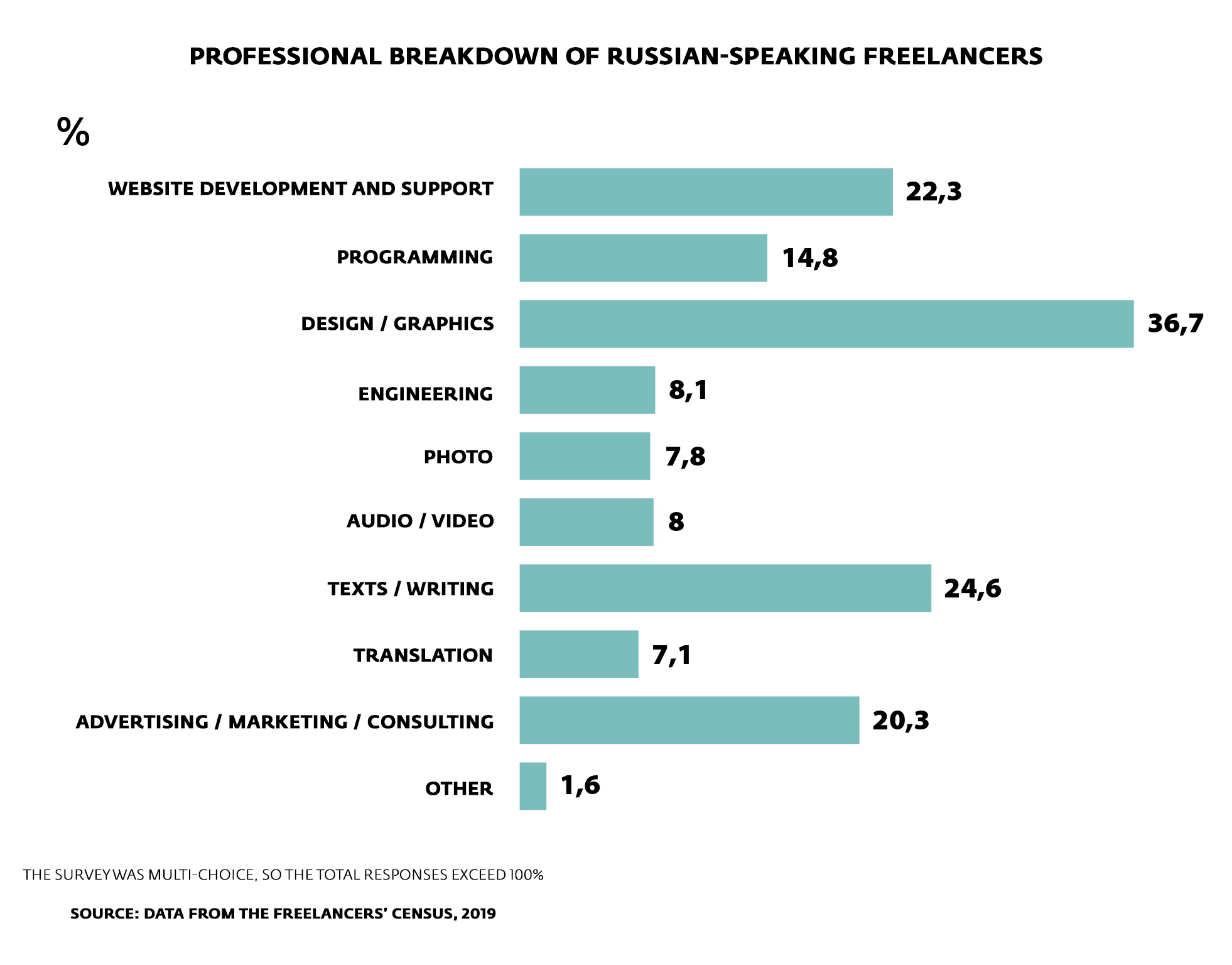The Kings of Remote Work: HSE Experts Dispel Myths and Stereotypes about Freelancers

Due to a longstanding lack of evidence-based information about freelancers, Andrey Shevchuk and Denis Strebkov, senior research fellows at the HSE Laboratory for Studies in Economic Sociology, have endeavoured to dispel misconceptions about this growing class of workers. Though remote work has become particularly relevant during the pandemic, the researchers identify several trends that have determined the direction of the remote job market even before the coronavirus outbreak.
A well-developed online infrastructure exists today in the form of a remote labour market — specialized websites, where freelancers and customers can find each other. The total number of users of these websites in Russian-speaking countries is already close to ten million. Of course, the real number of active freelancers is much lower. An account on a remote job search website is not an indication of one’s employment status, and many professionals are registered on several websites at the same time. For some, freelancing is a temporary, transitional phase in their career, while others see it as a source of supplemental income in addition to their main job. But it would not be an overstatement to say that, in recent years, several millions of Russians have already gained experience with working remotely or in freelance. It is still impossible to estimate the extent to which the number of freelancers will increase this year, but, undoubtedly, there are reasons to expect a further increase.

The researchers say that there is a clear deficit of evidence-based information about freelancers; instead, a range of myths and stereotypes surround the image of the freelancer. Using data received from their studies, which span more than a decade, the authors therefore seek to dispel these myths. They identify a series trends that have determined the development of the freelance and remote work markets even before the pandemic.
There is a popular image of a freelancer with a laptop on a beach somewhere in Goa. In fact, only a very small share of Russian freelancers lives far abroad – about 2-3%. On the other hand, a lot of freelancers who live in post-Soviet countries and speak Russian can participate in the Russian remote job market and have Russian companies as their customers. Still, the majority of Russian-speaking freelancers lives in Russia (71%), and particularly, in Moscow (14%) and St. Petersburg (8%), while the share of other regions is growing every year.

Freelancers include not only programmers, website designers, and other IT professionals, whose work has been conducive to being performed online from the start. They also include designers, journalists, translators, photographers, and even engineers. The share of various business-related services has been growing recently, including consulting, marketing, advertising, and other areas. The pandemic will most likely incentivize making many other professions remote.
Is a freelancer a talented self-taught person? No, not exactly. Surveys show that freelancers have high levels of education, with two-thirds of them holding a university degree (as compared to 30% of all Russians). Meanwhile, 36% of freelancers with a university degree work in a field that is different from their degree. Surveys among customers demonstrate that the main advantage in hiring online freelancers is the opportunity to attract highly qualified professionals for a short period of time (66%) for comparatively low pay (49%) on an ongoing basis that wastes as little time as possible (50%). This means that freelancers are often hired to quickly complete complicated and unconventional tasks that businesses cannot complete on their own. An incompetent person wouldn’t be able to handle tasks of this nature.

It may seem that freelancing in Russia is for younger people, while in developed economies, freelancing is a conscious choice for a middle-aged successful professional. This was mostly the case ten years ago. But over the last decade, the average age of freelancers in Russia has increased from 27 to 34. Today, more experienced and older people with families and kids are freelancing. Interestingly, the share of women has also grown from 33% to 42%.
There is a popular opinion that a freelancer is a relaxed, if not a lazy, person, who sleeps until noon and takes a stroll during working hours. But in Russia, the average work week for a freelancer is longer than that for a traditional employee. The variation of working hours is high among freelancers: 30% of them work less than 35 hours a week, while 28% work over 60. Freelancers work at nights and on weekends much more often than other Russians. Freelancing is a form of employment that can more flexibly fit with different lifestyles, as compared to the usual 40-hour conventional working week.

Is it easy to be a freelancer? The need to self-organize and set clear work/life boundaries has become a serious challenge faced not only by freelancers, but by the wider population of professionals during the pandemic. People have taken for granted the fact that their space and time is structured by their employer. You leave the office at 6 pm, and you are free. But, while working from home, employees have become responsible for their performance in a situation where their workplace is in their bedroom, their spouse is asking them to take out the trash, their in-laws are watching TV, and their kids are running around the apartment.
Self-organization is one of the soft skills that are essential to everyone in the new world, and it is something kids should be taught at school today. A freelancer is responsible for their own life. As HSE Rector Yaroslav Kuzminov rightly notes, in order to become a successful freelancer, in addition to professional skills, one must have soft skills, such as the ability to negotiate, present oneself, make a good impression on customers, resolve conflicts etc.

But there is one widespread perception of freelancing that has been confirmed by evidence over the years. It is true that the majority of freelance employment in Russia exists as part of the informal economy. For example, the research data shows that no more than one-third of deals between freelancers and customers are formalized. It seems like the recent state experiment on the legalization of self-employed professionals has been successful: the Russian Federal Tax Service says that over one million people have registered on the special app for the self-employed. However, the self-employed have the right to expect more than merely fiscal interest from the state.
Freelancers are interested in having access to medical care, retirement benefits, as well as labour rights. Professionals who work remotely should not be cut off from the social benefit system, which is a cornerstone of modern society, but covers mainly ‘conventional’ professionals, who have a job contract with an organization. The pandemic has revealed the problem in its full: countries all over the world have faced the need to provide for their citizens’ lives and well-being, independently of their employment status. In other words, the prospects for freelancing and remote work are directly related to the evolution of a new model of the social state for the post-industrial era.
Denis Strebkov
Associate Professor, Department of Economic Sociology
Andrey Shevchuk
Associate Professor, Department of Economic Sociology
See also:
Gender Asymmetry Affects Labour Market
According to Natalia Tikhonova, a social scientist with HSE University, gender asymmetry has been on the rise in Russia's labour market over the past 20 years. Gender asymmetry is reflected in the ‘feminisation’ of white-collar jobs and a disproportionate number of men among blue-collar workers. In addition to this, increasing automation in traditionally male industrial sectors is leading to fewer jobs available to men. In contrast, occupations with a growing demand for skills tend to be those which are mainly filled by women.
Trapped by a Flexible Schedule: The Pain and Price of Freelance Work
A flexible schedule is one of the main advantages of freelance work. But don’t rejoice in your freedom just yet: self-employment often disrupts the balance between life and work and takes up more time than traditional office work. HSE University researchers Denis Strebkov and Andrey Shevchuk investigated the downsides of independent work.
Corporate Social Responsibility Brings Benefits to Business
International companies engage in social responsibility in order to to improve their reputation, be more competitive, and to gain political benefits and some degree of control over society. In Russia, however, businesses convert social investment into informal privileges granted to them by government, according to a paper by Olga Kuzina, Professor of the HSE Department of Economic Sociology, and Marina Chernysheva, postgraduate student at the same department.
Classics in New Economic Sociology
On January 27, 2015, HSE First-Vice Rector Prof. Vadim V. Radaev and Dr. Greg B. Yudin announced the closure of ‘Classics in New Economic Sociology’ - a mega translation project of the HSE Laboratory for the Studies in Economic Sociology. The project ran from 2001-2015.
Russia and Germany: Current Situation, Lessons, and Cooperation
An international workshop, ‘Germany’s Transformation after its Unification: Current Situation and Lessons for Other Countries’ was held on September 12th and 13th, 2013 at the HSE. The workshop was organized by the HSE in collaboration with the Liberal Mission Foundation and with the support of the Friedrich Naumann Foundation.
‘As Sociologists, We Have a Unique Perspective on the World’
Shannon Davis, Ph.D., Associate Professor of the Department of Sociology and Anthropology of George Mason University (USA) is visiting Moscow this week for the seminar ‘From the Great Recession to Greater Gender Equality? Family Mobility and the Intersection of Race, Class, and Gender’ organized by the HSE Laboratory for Studies in Economic Sociology. It will take place on March 19.
ESforum, HSE economic sociology bulletin
A special issue of ESforum, a bulletin on economic sociology, was published in English.
Sociological Theories: a View on the Economy
From October 25th – 28th an international academic conference ‘Embeddedness and beyond: Do sociological theories meet economic realities?’ took place at the HSE. Here are some video interviews with conference participants.
A Fresh Issue of Economic Sociology
A new issue of Economic Sociology European Newsletter has just been published (Volume 13, #2, 2012). This publication is dedicated to Russian research in economic sociology.


